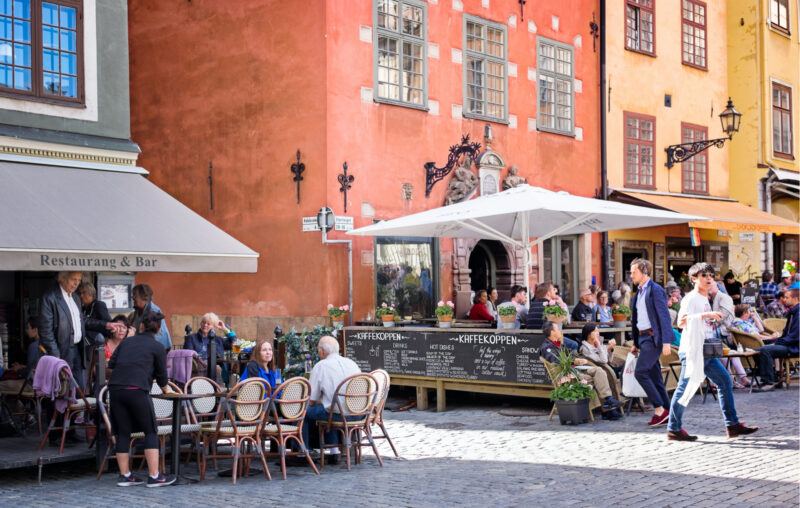The ’Rona Squeeze and a Swedish Hip-Hopper

And so it was time again. Tightened restrictions, mandatory limits on public life, curfews, orders to stay-at-home, travel bans with invasive hoops, and all the other anti-corona policies that ostensibly aren’t lookdowns: they look like lockdowns, they quack like lockdowns, but in these euphemism-prone times we call them by any other names than lockdowns.
Maddeningly, the goalpost keeps shifting, updating life and language faster and better than George Orwell himself could have done. First, we had to take precautions to flatten the curve. Hospitals and fears, remember? Then we had to stop traveling, or visit the mall ‒ because who needs that, anyway?
Then we had to wear cloth over our faces and stay away from each other. For the elderly’s sake, naturally. Then we had to give up public life for everyone’s sake. The next step, bravely taken by authoritarian politicians and epidemiologists across the Western world, is to intentionally overdo the restrictions ‒ “for now” ‒ so that we have any hope of getting freedoms back for the holidays.
No matter how hard these enlightened autocrats have squeezed, this badly-behaved virus refuses to listen. How odd, they must think; we passed a law, made an announcement ‒ why isn’t it working?
Back to your rooms, the Austrians said. After an explosive number of positive tests in the last week, enough with the provisional liberties and niceties, you’re grounded for the rest of November. Gatherings and cultural events are closed; Christmas markets are out. The Icelanders, already in the spring proclaimed corona free and all summer celebrated in puff pieces by Elizabeth Kolbert in The New Yorker and Adam Roy Gordon in the Atlantic, still dreamily speak of celebrating Christmas.
When the latest rounds of tighter and tighter restrictions came into effect this week, the government talking heads, and the prime minister in particular, told their subjects to give up on Halloween and the next few weeks. Let’s sacrifice these few weeks, they said, so that we can loosen restrictions for Christmas. Fat chance.
The Brits and the French have been even more adamant on setting timelines, or “circuit-breakers,” on their invasive policies. We strip you of liberties, dignities, and the things in which most people find joy ‒ but for a good cause, and just for a little while, okay?
The naivety here was always impressive. Fool me once, shame on you; fool me twice, shame on me. Most people could have plausibly believed what their politicians told them about timelines in the spring; this was a new situation, we didn’t know what the novel threat was, and old handbooks could be thrown out before anyone had time to object. The withdrawn freedoms would be rolled back in time, but as political economist Robert Higgs taught us long ago, never quite fully.
A little over half a year later, we’re going through the same ordeal again. With much better knowledge about the (overblown) risks, with much better tools in preventing spread and safeguarding the elderly. Still, it doesn’t seem to matter. The political overlords, not exactly known for their excellence in interpreting statistics, look at their exponential graphs ‒ and do the exact same thing they did in the spring.
It’s almost as if the virus doesn’t care about your crackdowns, your faster and harder tightening of the societal and commercial noose. If you squeeze people just a little bit more, maybe ‒ just maybe ‒ the virus will listen…? French ministers, like American policy-makers in the spring, started mandating what kinds of products may be on the supermarket shelves: soap is acceptable; makeup isn’t. The Germans, widely celebrated for their track-and-trace program and generous financial schemes, opted for a “mild” lockdown ‒ “just” for four weeks.
Perhaps, suggested Holman Jenkins in the Wall Street Journal recently, “the bigger numbers might suggest we are grappling with a natural phenomenon over which we exercise little control.”
Take the bamboozled and highly infected discussion over mask-wearing. They’re effective, they’re not effective; they’re effective if you use them right; and even if they’re not, every little bit counts. In its beautiful infographic the New York Times describes how they work: “A good mask will have a large surface area, a tight fit around the edges, and a shape that leaves space around your nostrils and mouth.”
Even if accurate, we don’t need to go much further than our closest supermarket to notice that that’s not the kind of masks worn by most people. Most people wear loosely fitted, thin pieces of cloth that probably capture some particles ‒ what do I know? ‒ but is unlikely to approach the efficacy that its proponents describe. We reuse them without washing them ‒ can anyone really be bothered? ‒ we don’t put them on properly, they leak left-right-and-center.
The fallback line? Well, not individually but they’re part of a bigger package. The New York Times quotes Linsey Marr at Virginia Tech saying that “something is better than nothing.”
Perhaps every little helps in a what-otherwise-would-have-been sense, but that’s not how most decision-makers justify the above withdrawal of our liberties. Rather, they say that the infection rates are “too high,” the curve too steep, the hospital capacity for treatment too close for comfort. Presuming their honesty ‒ the faking of which I don’t put past them ‒ there’s scant evidence that aggregate mask use correlates in any way with infection rates.
Sweden, where virtually nobody outside hospital settings uses masks, has had lower 7-days rolling deaths per capita than the U.S. for four months straight; lower than the mask-wielding and lockdown-prone U.K. for almost two months. Even the much-praised German experience now has more people dying from (and with) Covid-19 than Sweden does. Infection rates and spread too: the trends since the height of summer or beginning of fall look the same, regardless if you’re a massively mask-wielding country or not.
Yes, it is possible that without widespread mask use among Americans and Brits, infection rates would have even higher and death rates too. I keep wondering, what would the numbers have to look like for you to even consider that what we’re doing isn’t working? That perhaps locking down societies, practically, doesn’t do much to combat the disease, but quite a lot to ruin people’s lives and livelihoods?
We can choose cherry-picked countries for our various cases all we like: the “success stories” of Vietnam, New Zealand, or Australia haven’t done things much differently than Denmark, Austria, France, U.K. or the U.S.: squeeze your populace, and say the magic incantations. Perhaps the virus deity will grant your wishes.
I’m reminded of two-decades old words by Jason Diakité (stage name ‘Timbuktu’), one of my favorite musicians and one of the most successful hip-hoppers in Sweden. In the early 2000s, he released a pretty obscure song called Ett Brev (“A Letter”) structured like a letter to the then-prime minister of Sweden. A political rapper ‒ naturally hard left like all good artists ‒ Diakité was objecting to the many frightening trends he saw in Europe: dismantled social safety nets, overburdened health care services, opposition and hatred towards immigrants. He explicitly included a list of countries where Nazis were allegedly “gaining the upper hand” in typical Antifa-like hyperbole: France, Italy, “BeNeLux,” and Sweden’s immediate neighbor Denmark. The list of places going radically south, as he saw it, was long.
In all of these places, “Forces for good have presumably surrendered.” Little did Diakité know that almost two decades after he penned those provocative lines, his words would ring true across most of the Western world.
The authoritarian threat of 2020 is very different, and instead of neo-Nazi movements of the early 2000s the culprits are established, well-meaning politicians and technocrats. Much like then, Sweden is depicted as a beacon of light, standing against a world gone mad, the last outpost of sanity and the values underpinning Western Liberal Democracy.
Most everywhere else, different rules apply: no matter the facts, we must squeeze harder. The badly-behaved virus must stop progressing, must cease and desist. Anything else, apparently, “just doesn’t seem worth it.”













